

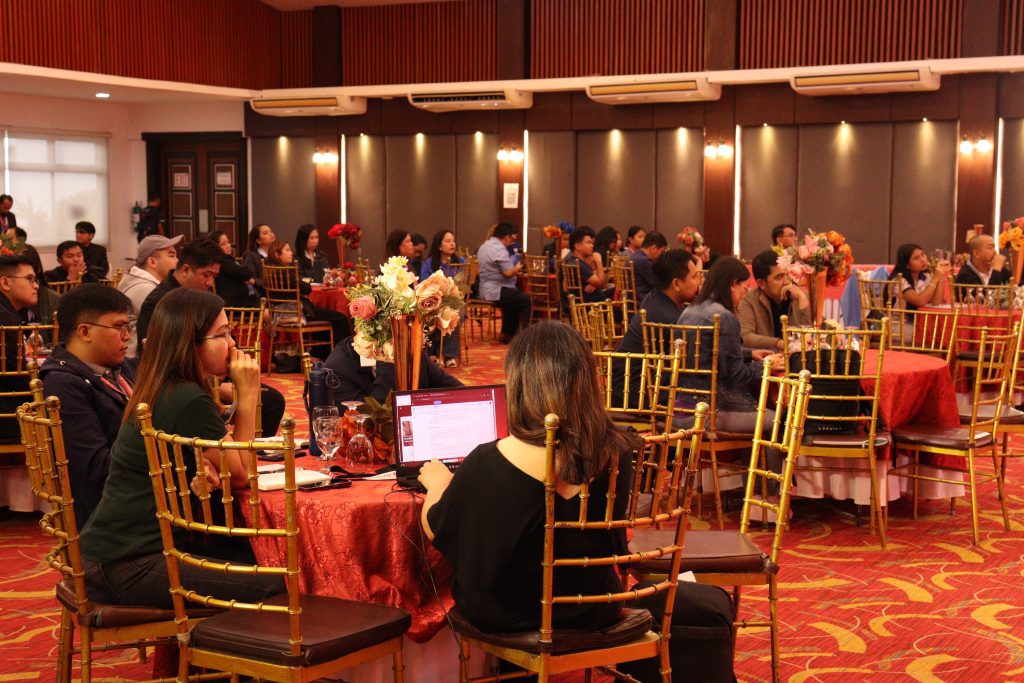
CSD ramps up sustainability drive, unveils green innovations for HEIs at the 3rd Sustainability Summit
by Center for Sustainable Development | March 19, 2025
by Center for Sustainable Development
March 19, 2025
Batangas State University (BatStateU), The National Engineering University of the Philippines, strengthened its commitment to sustainability by hosting its 3rd Annual Sustainability Summit on March 19, 2025. The event, themed “Usapang Sustainability 2025: Innovating Green Practices for Higher Education Institutions,” took place at Narra Hall, 5/F of the Jose Rizal Building at the Pablo Borbon Campus.
The summit aimed to drive sustainable innovations and environmental conservation efforts across higher education institutions (HEIs). It was participated by the stakeholders of BatStateU, other State Universities and Colleges (SUCs), local high school and government agencies with a total of 138 attendees. It brought together local and international experts to share best practices and address key areas for improvement, including green space management, water conservation, waste treatment, and renewable energy expansion.
BatStateU’s commitment to sustainability
In his opening remarks, BatStateU President Dr. Tirso A. Ronquillo highlighted the urgent climate challenges faced by the Philippines and the role of educators and innovators in developing sustainable solutions. He underscored the university’s dedication to supporting the United Nations’ 17 Sustainable Development Goals (SDGs) and emphasized the importance of collaboration to drive lasting change.
“At Batangas State University, we recognize the responsibility we carry as the Philippines’ National Engineering University. We are fully committed to supporting the United Nations seventeen sustainable development goals, and we take this mission seriously in shaping a more sustainable future, not just for our community, but for the world,” Dr. Ronquillo stated.
BatStateU has integrated sustainability into its core pillars—governance, education, research, and extension services. Its efforts are reflected in its improved global rankings, rising from 351st in 2022 to 304th in the 2024 UI GreenMetric World University Rankings, and maintaining its position in the 601-800 bracket in the Times Higher Education (THE) Impact Rankings. The university’s key initiatives include establishment of the Center for Sustainable Development (CSD) and Sustainable Development Office (SDO) across 11 campuses, SDG integration to curriculum, bike-sharing program, cleanup drives, and tree planting, with over 35,000 trees and mangroves planted since 2022.
Despite these achievements, Dr. Tirso emphasized that more work is needed and that collaboration is a key factor in advancing sustainability. He underscored the importance of Usapang Sustainability 2025 as a platform for idea-sharing and collective action toward a more sustainable future. Concluding his speech, he called on all participants to continue working together to make a lasting impact.
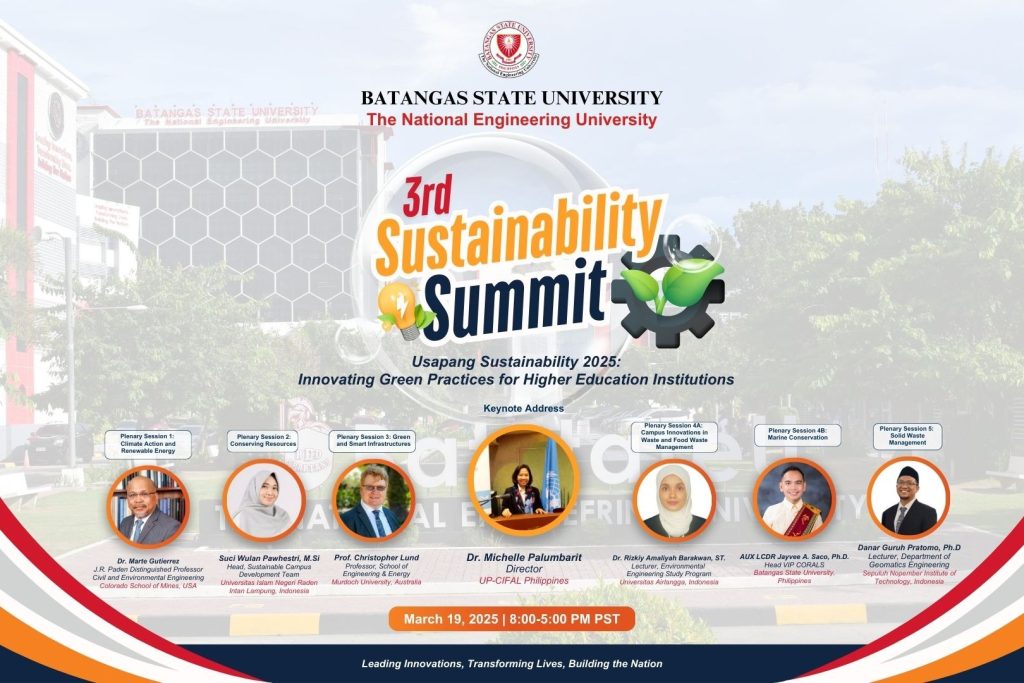
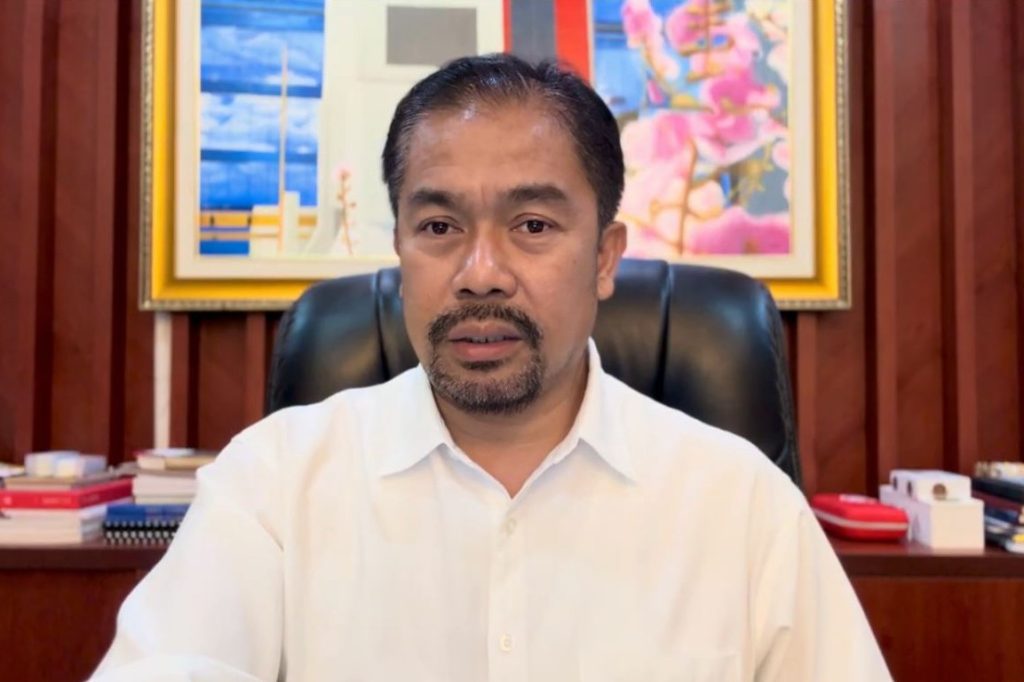
Key insights from the summit
The keynote address was delivered by Dr. Michelle Palumbarit, Associate Professor from UP Diliman and Director of CIFAL Philippines. She discussed the role of Higher Education Institutions (HEIs) in championing sustainability, benchmarking on the case of UP-CIFAL Philippines. In her discussion of the 17 UN Sustainable Development Goals, Dr. Palumbarit highlighted the primacy of planet-related SDGs, asserting that they form the essential bedrock upon which all other sustainable development efforts must be built. She further noted that developing countries, like the Philippines, face a greater challenge addressing environmental issues, as they often prioritize basic needs such as food security over conservation. This underscores the important role of higher education institutions (HEIs) in producing graduates with a sustainable mindset, highlighting the need to integrate sustainability into university research, education, and leadership.
Dr. Palumbarit concluded by showcasing UP-CIFAL’s sustainable development work, which encompasses research, public service, and capacity-building in collaboration with UNITAR and the UN, alongside its specialized training courses in migration, digital governance, and water governance.
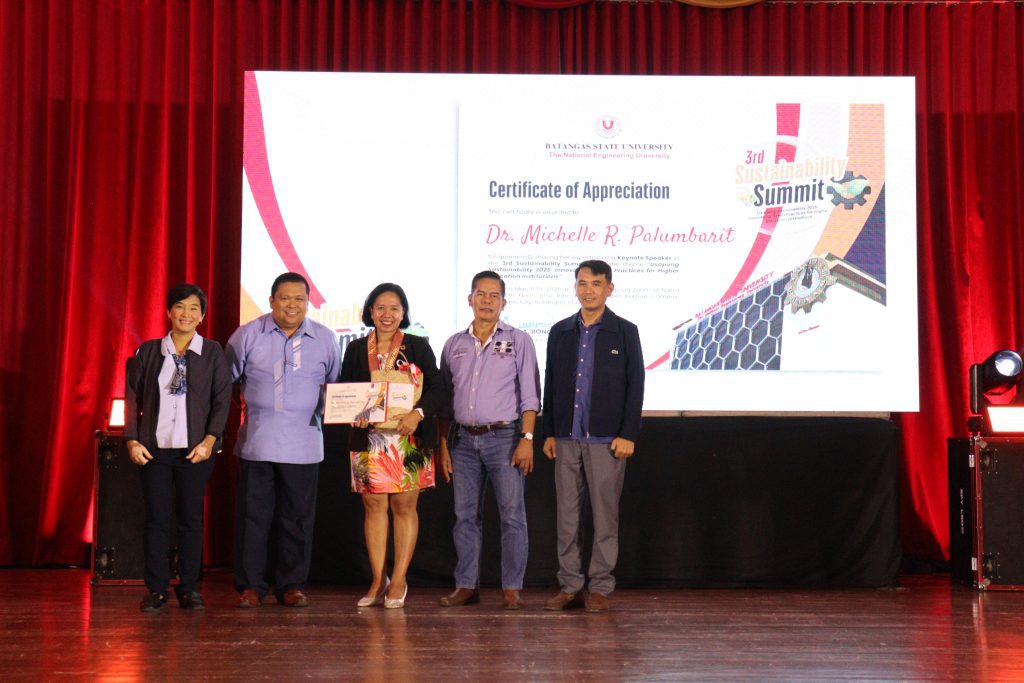
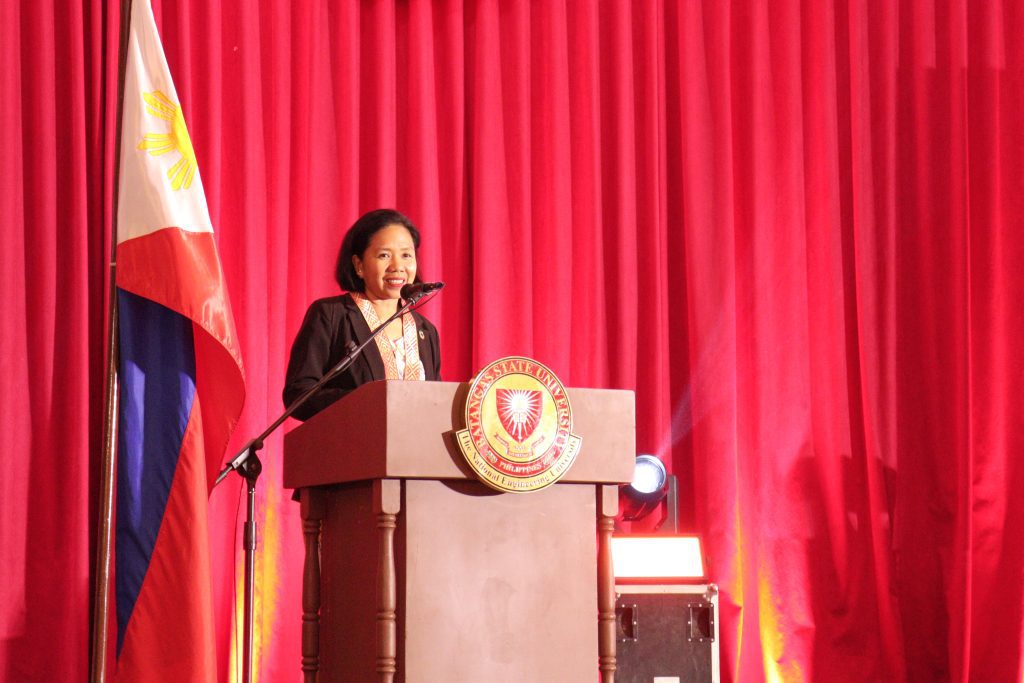
Plenary Session 1: Climate Action and Renewable Energy
Speaker: Dr. Marte Gutierrez – JR. Paden Distinguished Professor of Civil and Environmental Engineering, Colorado School of Mines, USA
Dr. Gutierrez, joined live via Zoom video conferencing, highlighted the vital role of universities in addressing climate change. His presentation, “Universities as Leaders in Climate Resilience and Carbon Reduction,” emphasized the impact of greenhouse gas emissions on vulnerable countries like the Philippines. Dr. Gutierrez urged universities to drive climate action through education, research, and sustainable practices. He identified key research areas, including electric vehicles, renewable energy, plant-based food alternatives, and plastic waste reduction. He also stressed the importance of preserving mangroves and coastal ecosystems. He called for integrating climate studies into curricula, developing renewable energy solutions, and achieving carbon-neutral campuses. Collaboration between academia, government, and industry, he said, is needed for advancing climate resilience.
During the Q&A session moderated by Dr. Nickie Boy A. Manalo, Head of Sustainable Development Office of Pablo Borbon Campus, Dr. Gutierrez discussed strategies for enhancing climate resilience and reducing carbon emissions at BatStateU. He emphasized integrating sustainability into academics, research, and community programs while recognizing students’ roles in climate advocacy. He proposed measures such as improving energy efficiency, adopting renewable energy, implementing zero-waste initiatives, and following green building standards. He also suggested encouraging student-led projects, promoting eco-friendly transportation policies, and developing systems to monitor carbon footprints. Additionally, he addressed the need for climate change expenditure tagging and recommended tools for tracking emissions to improve accountability.
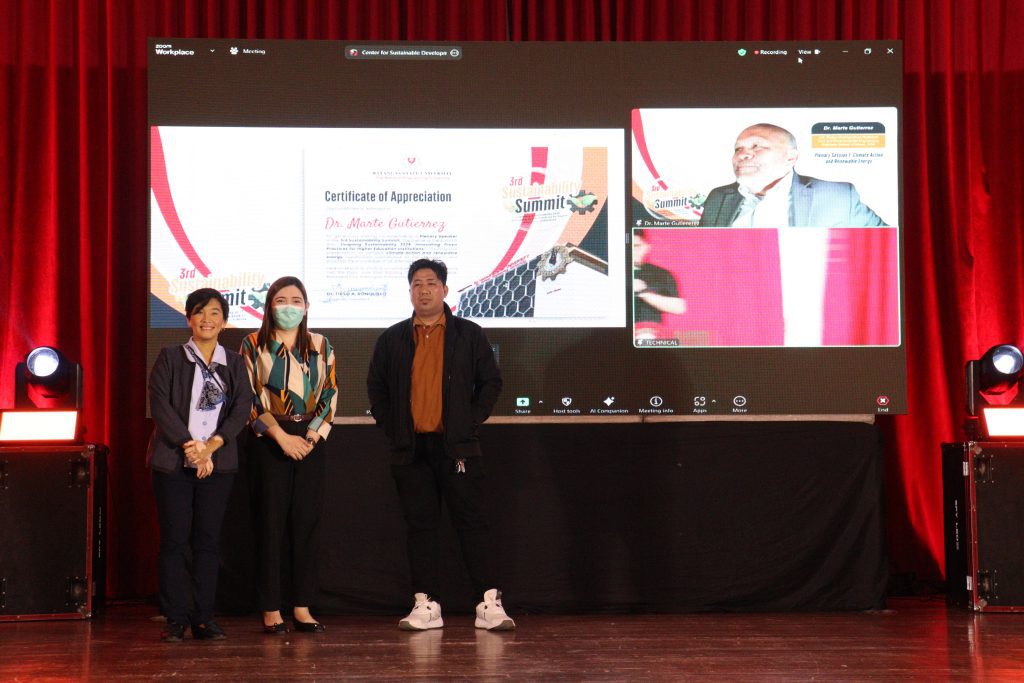
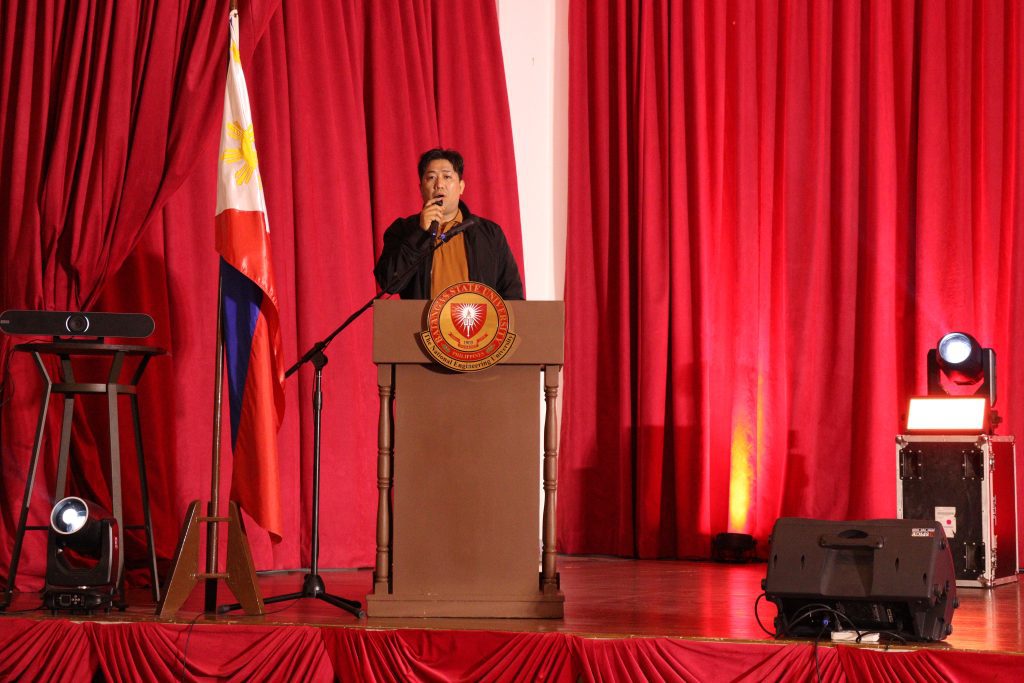
Plenary Session 2: Conserving Resources
Speaker: Suci Wulan Pawhestri, M.Si – Head of Sustainable Campus Development Team, Universitas Islam Negeri Raden Intan Lampung, Indonesia
Session 2 of the conference, led by Ms. Suci Wulan Pawhestri via Zoom, focused on sustainable water management aligned with SDG 6 (Clean Water and Sanitation). She highlighted her university’s strategies for efficient water use, particularly during religious rituals, and outlined conservation efforts such as rainwater collection, biopore infiltration holes, and artificial ponds covering 21% of open space. Additional measures include water-saving equipment, awareness campaigns, and recycling initiatives like aquaponics and hydroponics. Ms. Pawhestri emphasized collaboration, education, and community engagement for long-term sustainability. During the Q&A session, facilitated by Ms. Richelle A. Sulit, Head of Sustainable Development Office of Lipa Campus, university staff inquired about enhancing resource conservation and policy changes, with questions to be forwarded to the speaker for further response.
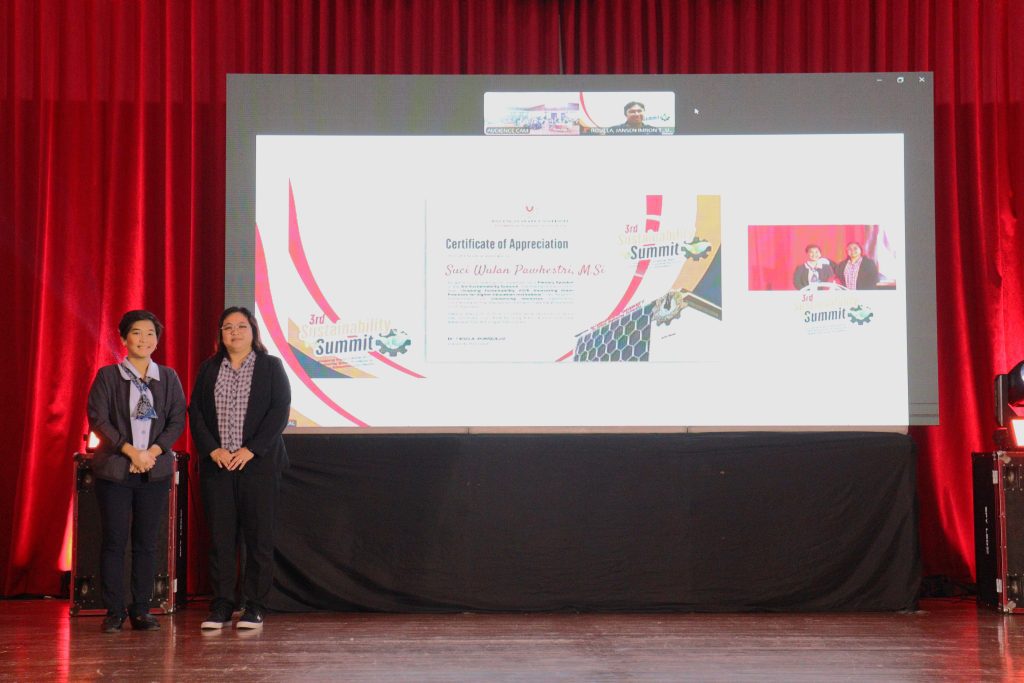
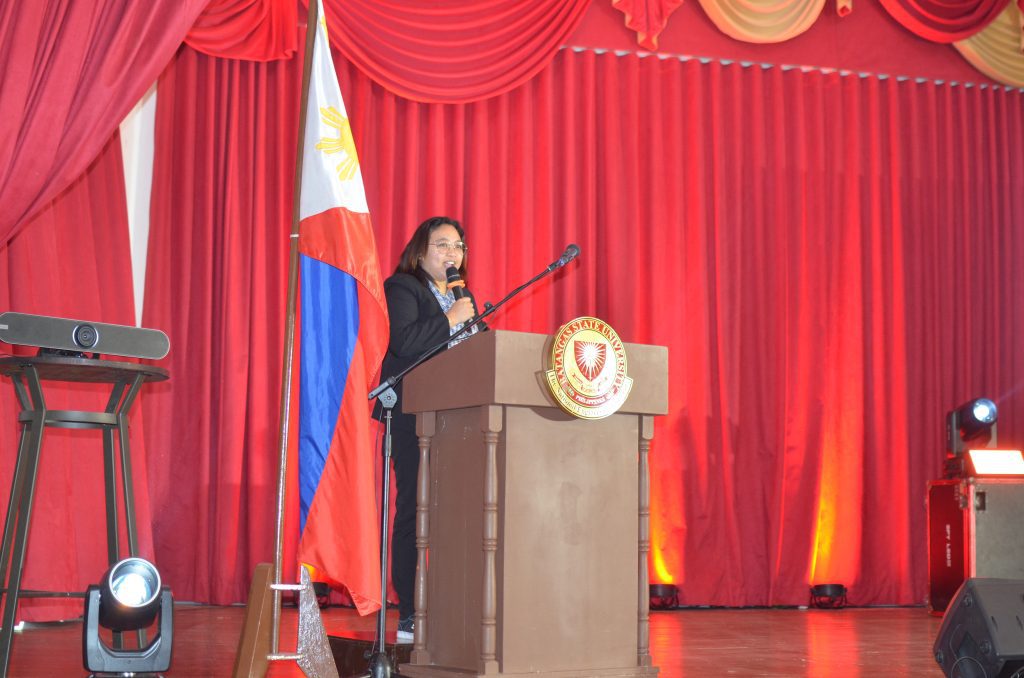
Plenary Session 3: Green and Smart Infrastructures
Speaker: Prof. Christopher Lund – Professor of School of Engineering & Energy, Murdoch University, Australia
In Plenary Session 3 on Green and Smart Infrastructures, Professor Christopher Lund discussed the integration of physical, digital, and human systems to create sustainable and inclusive smart campuses. He emphasized that smart campuses leverage digital transformation to enhance learning, teaching, and administrative processes while incorporating sustainable practices such as energy-efficient buildings, waste management, and smart grids. Moreover, Prof. Lund stressed the importance of accessibility, ensuring that students of all abilities can fully engage with campus resources. He also highlighted the role of green buildings in sustainability, incorporating environmentally friendly technologies and adhering to global or local green building standards. However, he noted that integrating smart technology into these buildings maximizes efficiency, enabling real-time monitoring, adaptive controls, and AI-driven optimizations. He concluded by asserting that embedding these concepts into university curricula and building collaboration can drive long-term innovation and sustainability beyond the campus.
Building on these discussions, the Q&A session focused on the challenges and strategies for achieving smart and sustainable campuses. Facilitated by Architect Mark Jannison Magsino, Head of Sustainable Development Office – Alangilan, he shared some key points from Prof. Lund’s discussion.
Architect Magsino opened the discussion by asking how Murdoch University secured Green Star accreditation and other sustainability certifications. Prof. Christopher Lund explained that achieving accreditation required extensive planning, government and institutional funding, and consultation with experts. The process involved identifying campus needs, negotiating with designers, and ensuring that sustainability initiatives aligned with both environmental and functional goals. Dr. Vaberlie Mandane-Garcia then asked about the challenges in promoting green building standards and the actions taken to address them. Prof. Lund highlighted that the biggest obstacle was the high initial cost of constructing green buildings. However, he emphasized the importance of considering the long-term cost benefits through life cycle assessments. He also stressed the need for strong leadership support and recommended starting with small-scale sustainability projects before expanding.
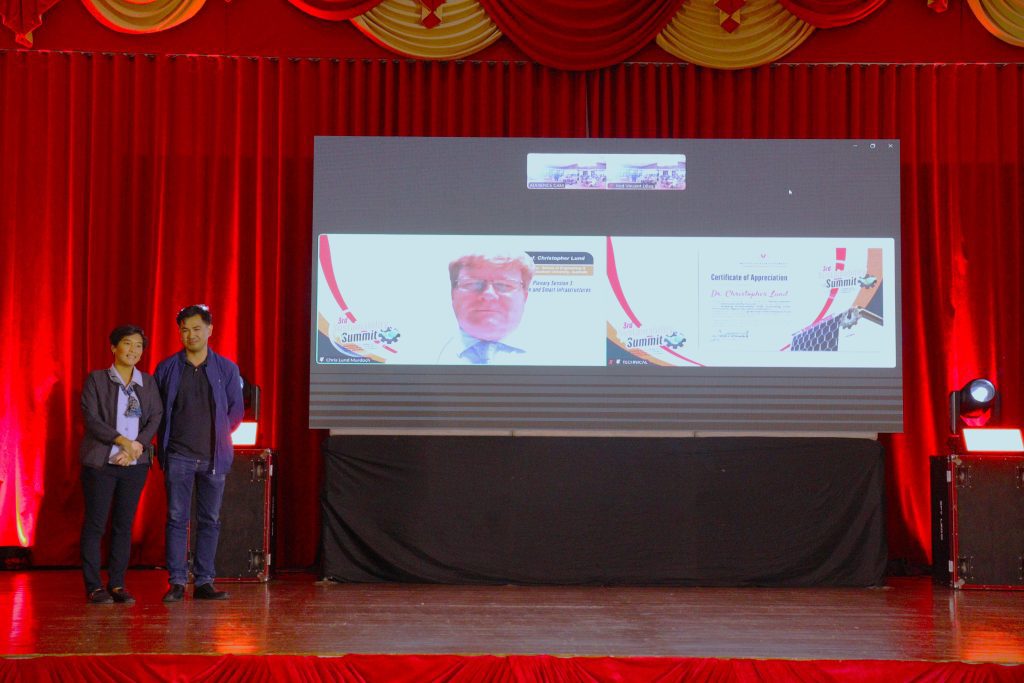
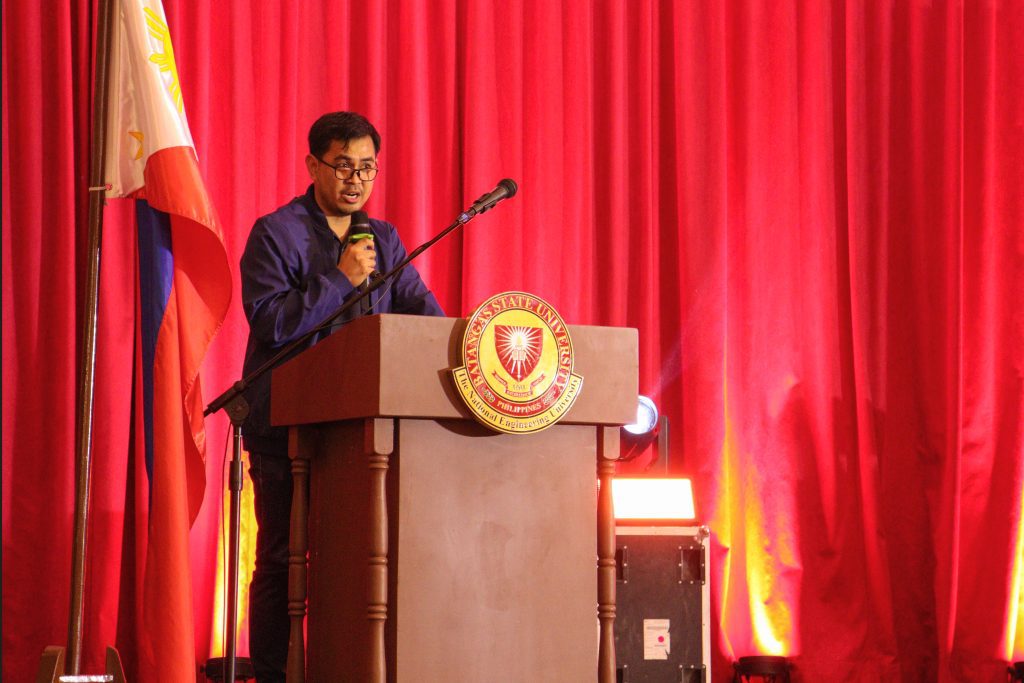
Plenary Session 4A: Campus Innovations on Food Waste and Waste Management
Speaker: Dr. Rizkiy Amaliyah Barakwan – Faculty of Environmental Engineering Study Program, Universitas Airlangga, Indonesia
Plenary Session 4A of the summit featured a presentation by Dr. Rizkiy Amaliyah Barakwan. Her presentation focused on food waste issues, sustainable solutions, and their alignment with Sustainable Development Goals (SDGs), particularly Zero Hunger (SDG 2), Responsible Consumption and Production (SDG 12), and Climate Action (SDG 13).
Dr. Barakwan introduced the waste management hierarchy, emphasizing the importance of prevention, reuse, recycling, and energy recovery before disposal. She also highlighted key food waste reduction strategies, including proper meal planning, redistribution to food banks, animal feed production, industrial applications such as biogas, composting, and landfill as a last resort. Additionally, she discussed Indonesia’s significant food waste generation, stating that their university integrated waste management topics into education, field studies, and interdisciplinary projects to encourage innovative solutions.
The Q&A session focused on food waste management and reduction strategies. Engr. John Denver F. Falculan, Head of Sustainable Development Office – Malvar, summarized key points from Dr. Rizkiy Amaliyah Barakwan’s presentation, including the waste hierarchy, food recovery pyramid, classification of food waste, and possible processing solutions.
The first question from an audience member asked how reducing food waste could contribute to better nutrition among students. Dr. Barakwan suggested repurposing food waste as new ingredients, planning weekly meal schedules, and promoting responsible food consumption. Another participant inquired about the easiest and most sustainable way to minimize food waste, to which Dr. Barakwan emphasized food chain management, source reduction, and waste audits as crucial steps.
Another question was raised regarding residual waste management on campus. Dr. Barakwan shared examples from Universitas Airlangga, highlighting how composting programs were integrated into university canteens and research initiatives. A participant followed up with a question about space constraints for composting at BatStateU. In response, Dr. Barakwan suggested exploring collaborations with NGOs or government agencies to overcome land limitations and expand composting efforts.
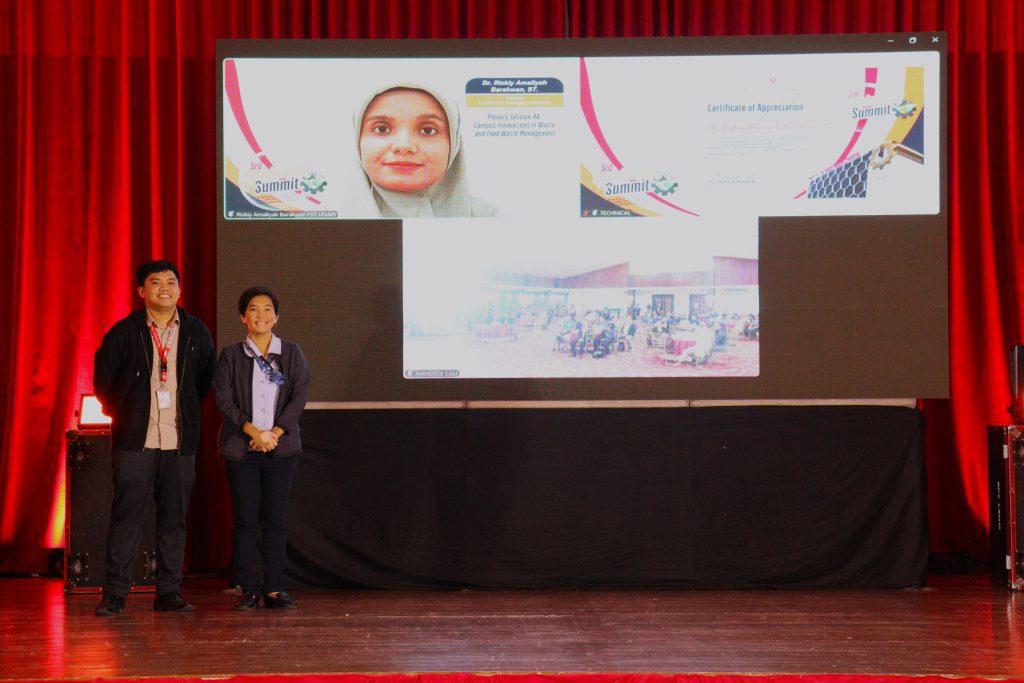
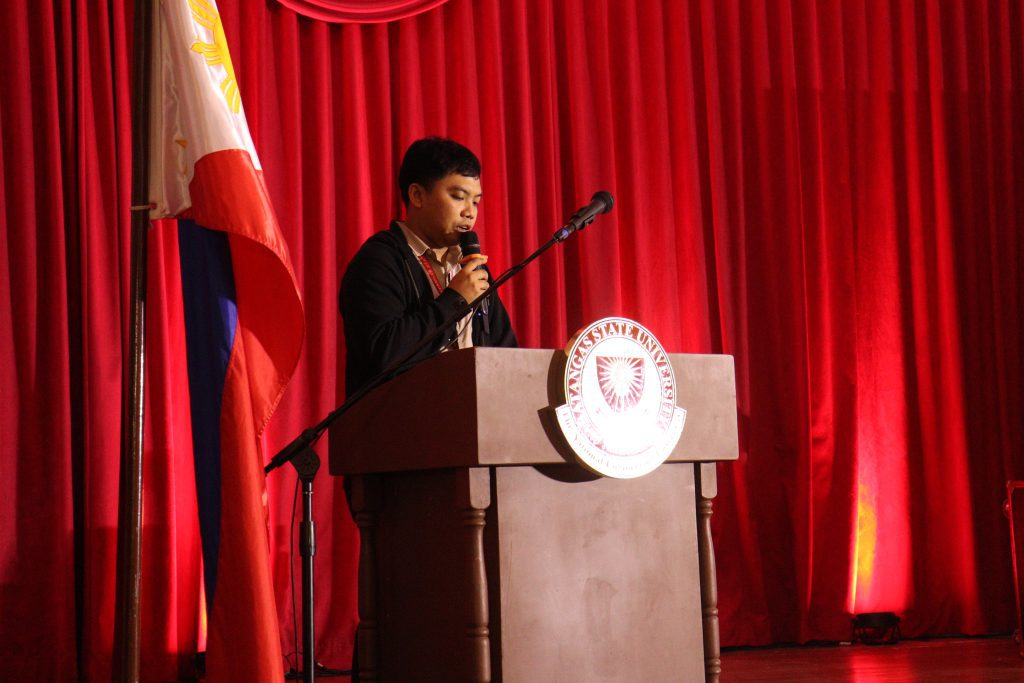
Plenary Session 4B: Marine Conservation
Speaker: Dr. Jayvee A. Saco – Head of Verde Island Passage Center for Oceanographic Research and Aquatic Life Sciences, Batangas State University – TNEU, Philippines
Plenary Session 4B on Marine Conservation featured a presentation by Dr. Jayvee A. Saco, Head of VIP CORALS. Dr. Saco highlighted the role of higher education institutions (HEIs) in marine conservation, focusing on the Marine Research Center for the Verde Island Passage (VIP CORALS).
The Verde Island Passage, recognized as the “center of the center” of marine shore-fish biodiversity, supports a wide range of marine life but faces threats from industrialization, pollution, and climate change. In response, Batangas State University established VIP CORALS in 2018 to conduct research on marine resources, conservation, and biotechnology.
Dr. Saco outlined the center’s key initiatives, which include habitat assessments, biodiversity monitoring, and sustainability programs. These efforts involve training local governments and communities in marine ecosystem management. Moving forward, the center aims to strengthen partnerships, expand conservation research, and empower local stakeholders to protect the marine environment.
Environmental challenges, such as green tide blooming and seagrass loss, were highlighted during the session. The university’s role in climate change mitigation, marine biotechnology training, and public awareness campaigns was also discussed.
The Q&A session focused on marine conservation efforts in the Verde Island Passage. Dr. Vaberlie P. Mandane-Garcia, Sustainable Development Officer and Vice President for Development and External Affairs, facilitated the discussion. She emphasized research, advocacy, and community engagement as key components of BatStateU’s conservation initiatives.
A question was raised about opportunities for faculty researchers. Dr. Saco encouraged faculty participation, noting that the center provides support for project development and proposal writing. Another participant suggested vlogging as a means to promote marine conservation. Dr. Saco supported the idea, emphasizing the value of social media engagement in raising awareness. An online participant inquired about livelihood opportunities connected to conservation projects. Dr. Saco shared the university’s work on seaweed farming as a sustainable livelihood option. He mentioned pilot projects and industry collaborations aimed at creating markets for seaweed-based products, including food items and industrial applications.
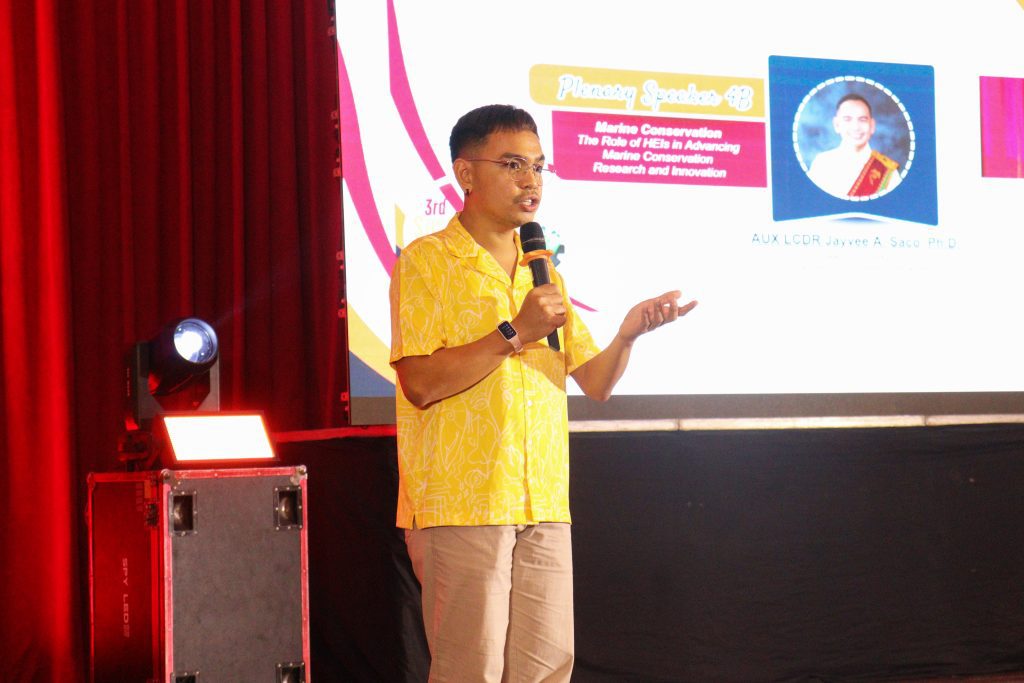

Plenary Session 5: Solid Waste Management
Speaker: Dr. Danard Guru Pratomo – Faculty of Department of Geomatics Engineering, Sepuluh Nopember Institute of Technology (ITS), Indonesia
At Plenary Session 5 on Solid Waste Management, Dr. Danard Guru Pratomo, Head of the SDGs and EcoSmart SmartEcho Campus unit at Institut Teknologi Sepuluh Nopember (ITS) in Surabaya, presented the university’s comprehensive waste management initiatives. His presentation covered strategies ranging from policy development to implementation, reflecting ITS’s commitment to sustainability.
Dr. Pratomo emphasized the university’s integrated approach by combining multiple campus units to enhance sustainability efforts in waste and water management. With a large student and faculty population, ITS has prioritized environmental responsibility through various programs and policies. He highlighted the ITS Smart Microcampus, established in 2011, which focuses on sustainable practices in waste reduction, transportation, energy efficiency, and environmental education.
Key initiatives include water treatment programs, hazardous waste management, and organic waste composting. ITS also promotes recycling through community participation and technological innovations, such as waste-sorting machines. The university enforces sustainability policies and continues to improve waste management systems to foster a more environmentally responsible campus.
During the Q&A session, facilitated by Assoc. Prof. Lorenjane Balan, Head of SDO – ARASOF Nasugbu, participants raised questions about other technologies and policies related to waste management in Indonesia.
A student leader inquired about alternatives to reverse vending machines for managing non-organic waste. Dr. Pratomo discussed Indonesia’s collaboration with banks to develop machines allowing students to exchange plastic waste for credits usable for transportation and other services. He also mentioned the TASTE initiative, where community members bring waste to collection centers for manual sorting, with plans for future automation. This initiative offers participants credits redeemable for organic vegetables, supporting a circular economy.
A university employee asked about other waste reduction policies beyond plastic minimization. Dr. Pratomo outlined ITS’s transition to digital documentation and online exams, as well as policies prohibiting single-use plastics at events and catering. Despite ongoing challenges, such as paper use in some departments and enforcement issues in university canteens, ITS has strengthened awareness campaigns and student engagement to address these concerns.
Another staff member questioned the effectiveness and challenges of the Eco Campus policy. Dr. Pratomo reported that ITS has significantly reduced plastic bottle consumption by encouraging the use of reusable water bottles and dispensers. Student volunteers play a key role in raising awareness and ensuring compliance. While challenges remain, the policy has increased environmental consciousness across the academic community and reflects the university’s progress in sustainability efforts.
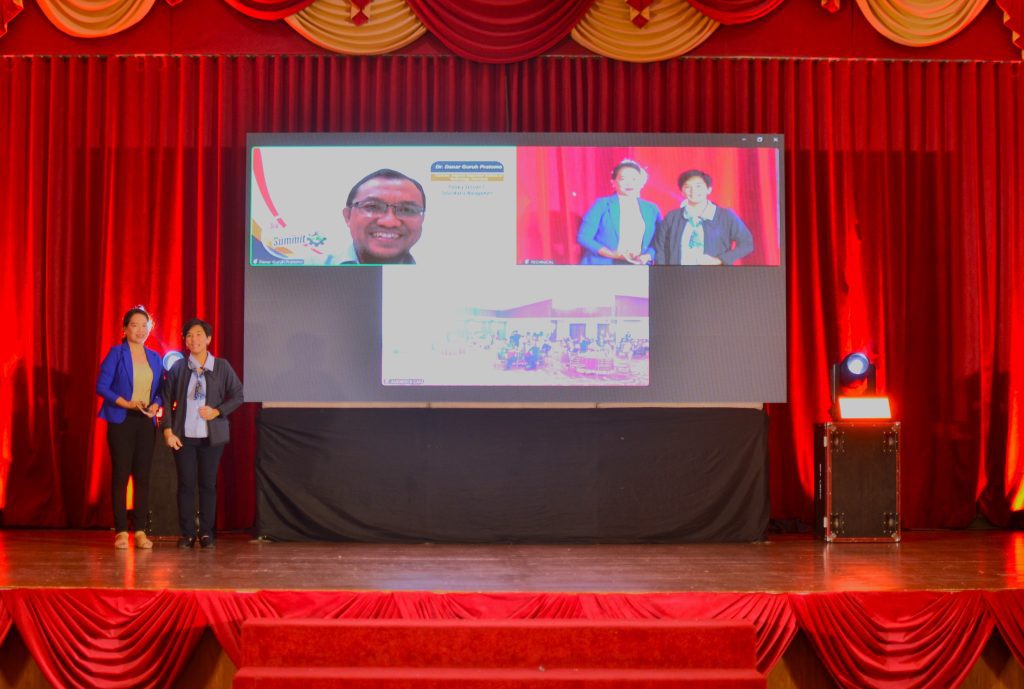
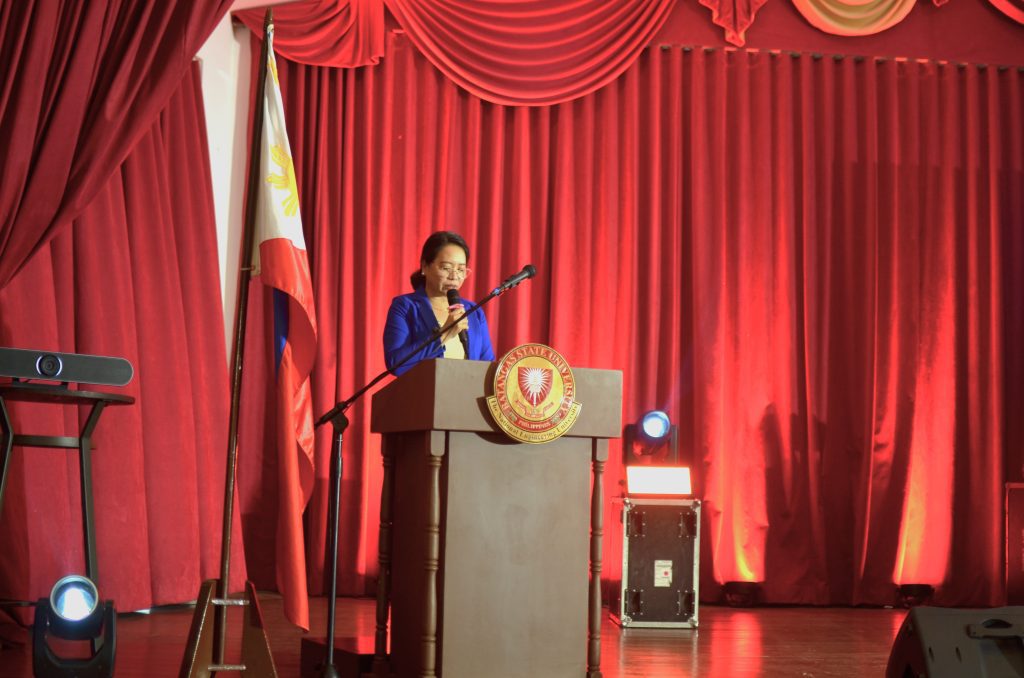
Ways forward
To conclude the sustainability summit, Dr. Mandane-Garcia delivered closing remarks emphasizing collaboration and innovation in advancing sustainability efforts within BatStateU and beyond. She expressed gratitude to plenary speakers, moderators, administrators, and participants who contributed to the discussion on green practices for higher education institutions.
Dr. Mandane-Garcia highlighted the need for affordable, scalable sustainability solutions, particularly for low-income communities. She called for increased research and innovation to develop cost-effective green technologies and underscored the importance of policy and governance to ensure lasting impact. She urged university leaders to integrate sustainability into development plans through initiatives such as rainwater harvesting, sewage treatment, and waste management systems.
She concluded by encouraging participants to take leadership roles, advocate for sustainability, and drive meaningful change in their institutions and communities.
Dr. Mandane-Garcia remarked, “As we close this third annual Sustainability Summit, we are also opening doors to hope. When we think, act, and work together, we can champion sustainability not just in our university, but also in our communities.”
The summit concluded with a photo opportunity featuring attendees from all BatStateU campuses.
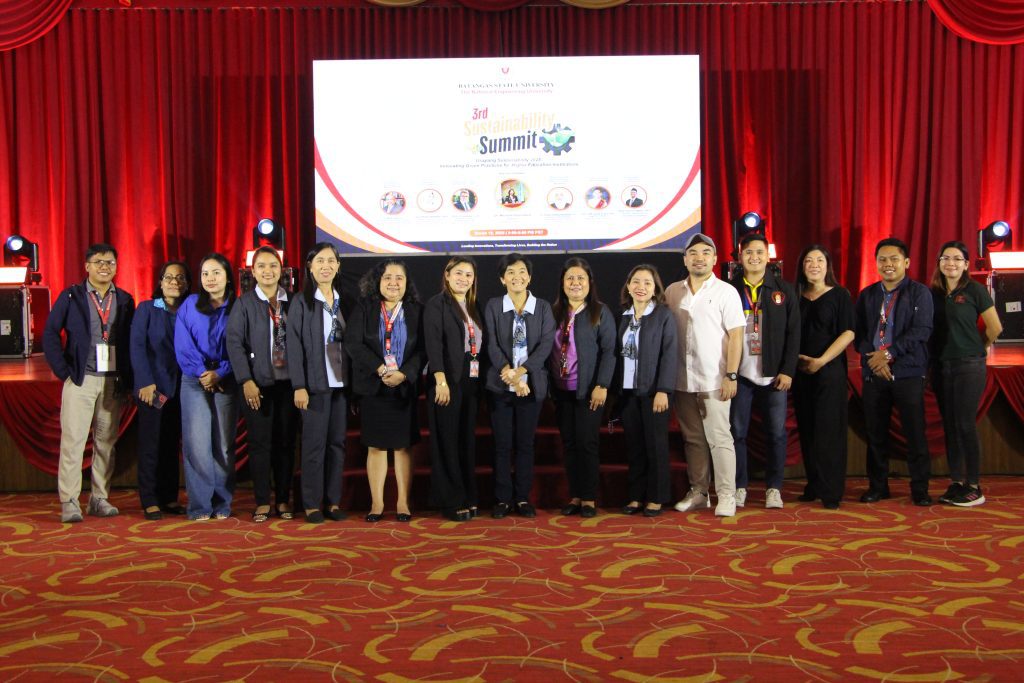
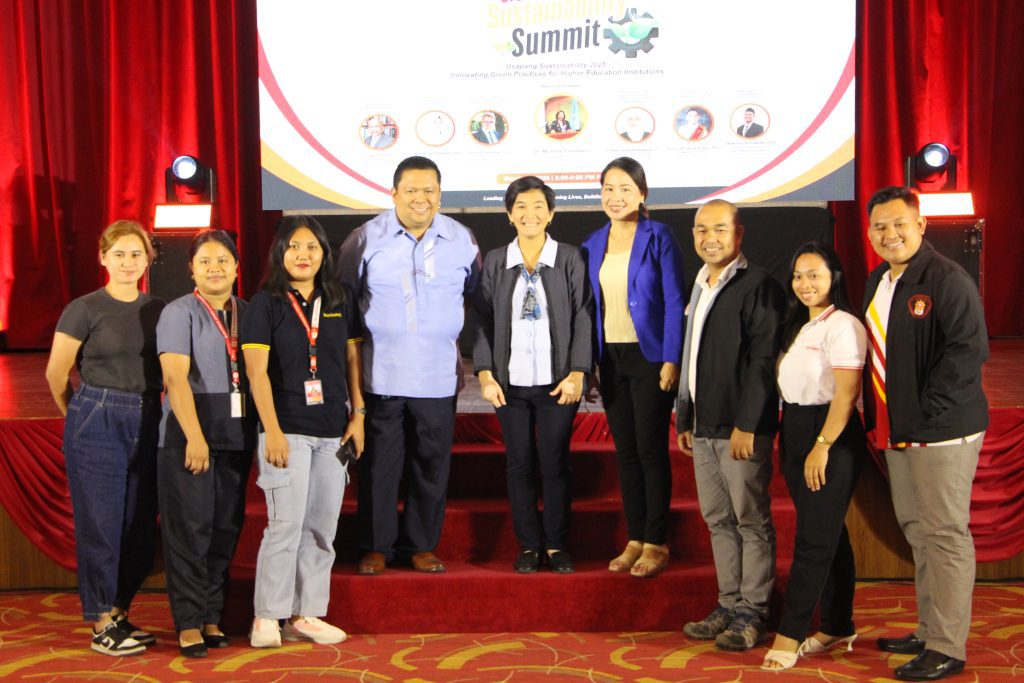
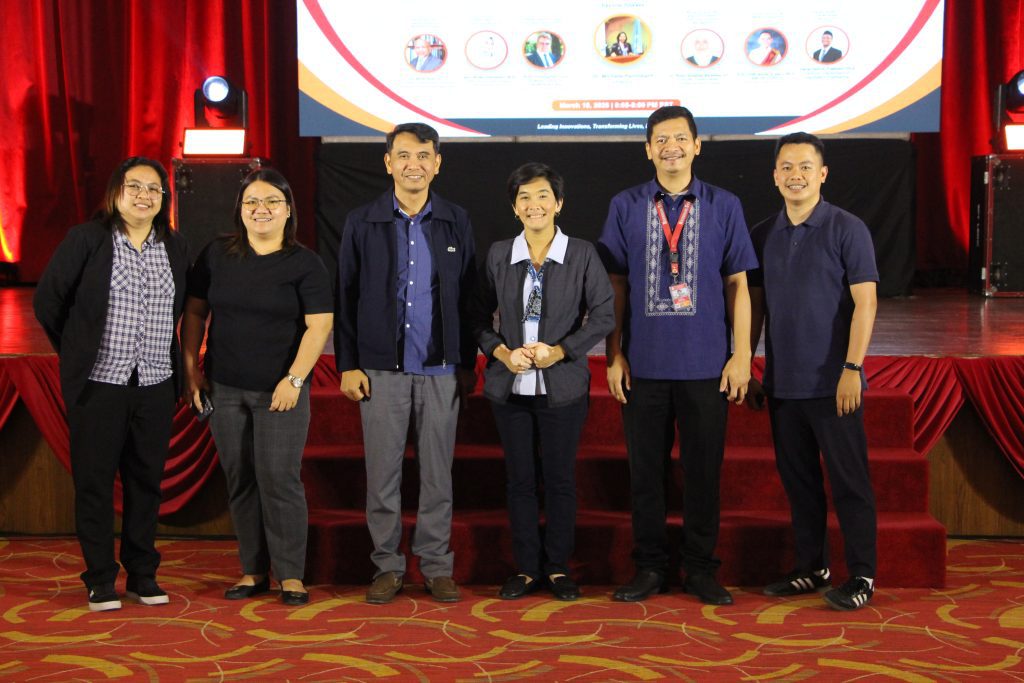
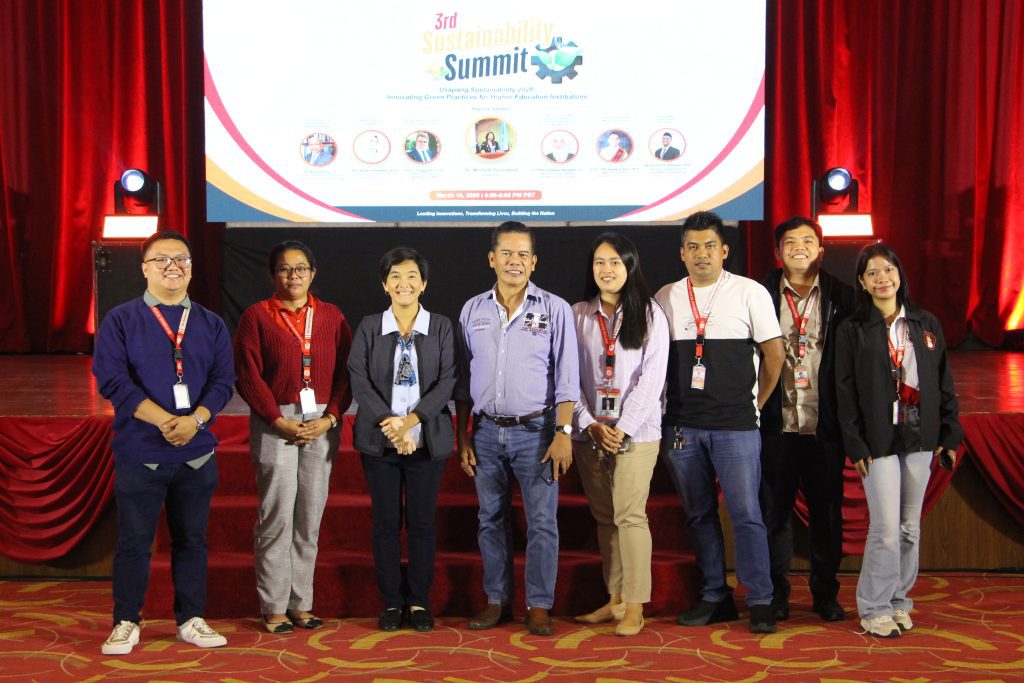
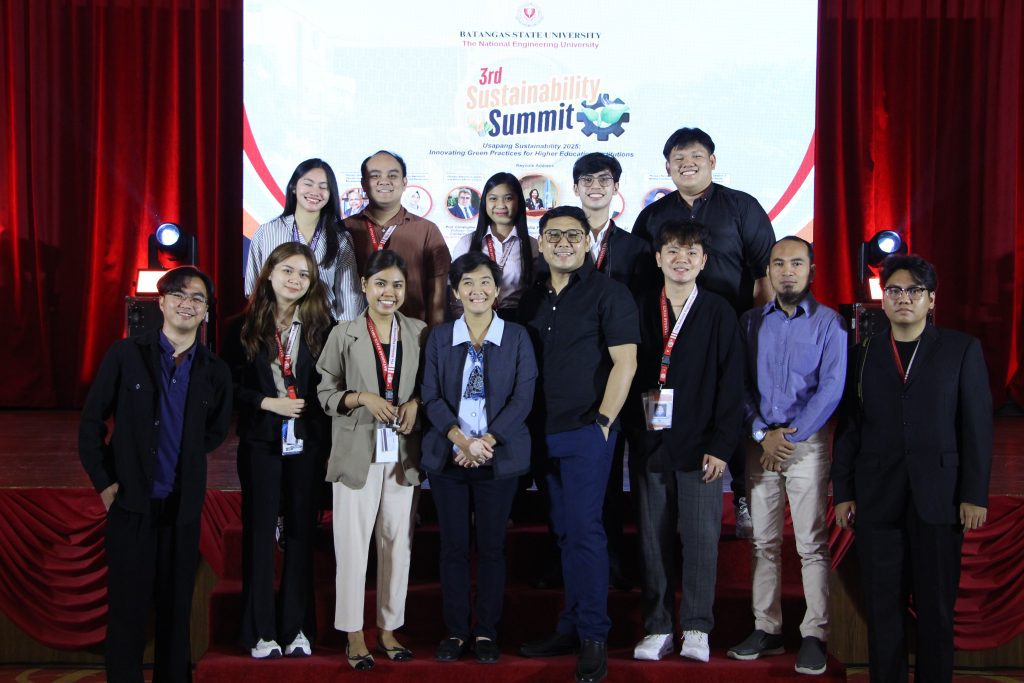
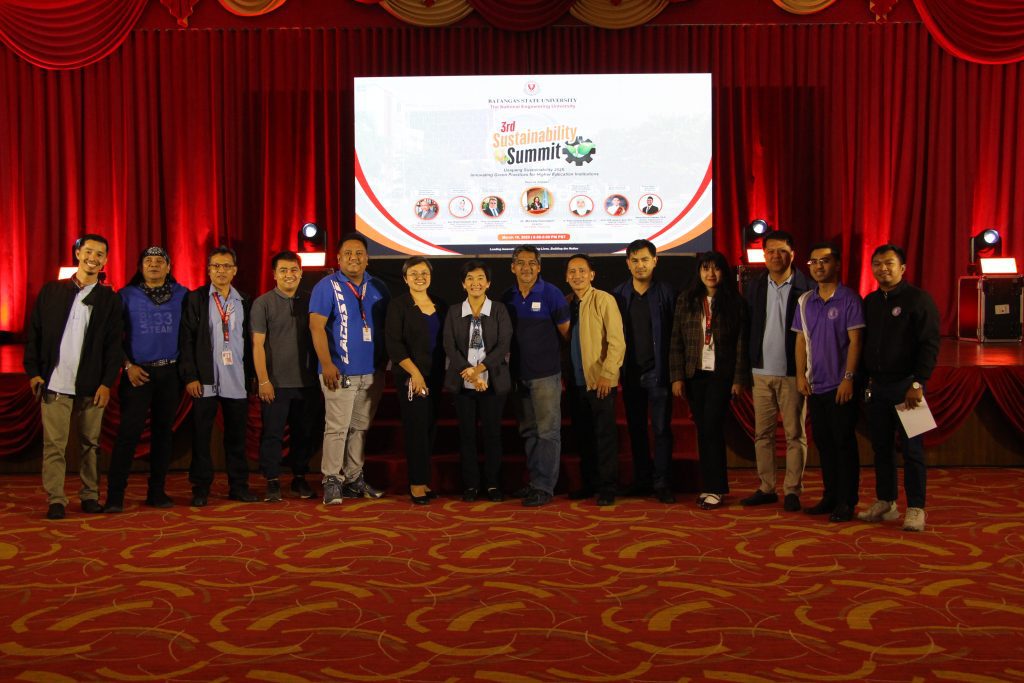
Recent Events
